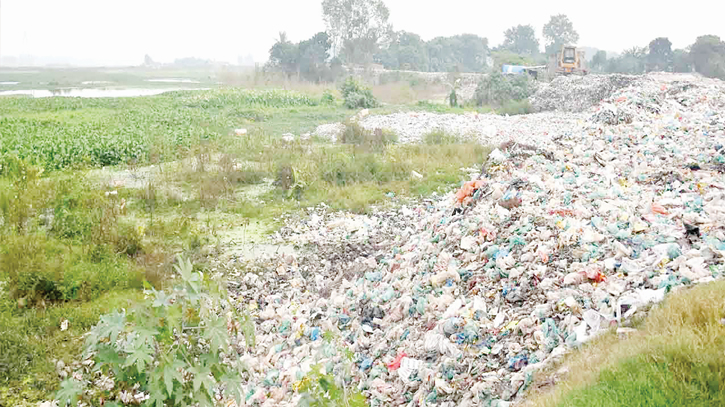
Improper waste disposal near the Dhaka-Aricha highway in Manikganj has caused significant suffering for city residents and farmers alike, with approximately one hundred bighas of agricultural land severely affected. Photo: Messenger
Municipal garbage dumped along the side of the Dhaka-Aricha highway has transformed the area into a hazardous wasteland, posing significant health risks to nearby city residents. The improper waste disposal at this site has rendered it a death trap for local farmers. Approximately one hundred bighas of agricultural land have been severely affected.
Despite long-standing pleas from the farmers to remove the waste and restore the land, municipal authorities have turned a deaf ear. This environmental catastrophe has taken root in Vatbaur, Manikganj, adjacent to the highway. In 2012, a dumping station was constructed on more than two units of land in the Vatbaur area of Dighi Union, Sadar Upazila, roughly four kilometers from the city.
Observations reveal that although the Manikganj municipality has a designated dumping ground, waste collectors have been discarding garbage onto nearby agricultural fields instead. This mismanagement extends to the Dhaka-Aricha highway, where waste is strewn, including household refuse, medical waste such as glass bottles, tubes, needles, syringes, blades, and polythene. The stipulated disposal protocols are blatantly ignored, resulting in agricultural disruptions. The stench from the waste torments the residents of adjacent villages and pedestrians along the highway.
Farmer Afzal Hossain recounts that they anticipated environmental pollution from the dumping station and erected barriers in protest. However, the authorities disregarded their concerns, establishing the station on more than two and a half acres of fertile land. Hossain laments that for the past eight years, agricultural productivity has plummeted, transforming once-thriving grain-producing land into barren plots. The improper disposal of waste, exacerbated by wind and rain, has contaminated surrounding lands, affecting approximately one hundred bighas.
Local Union Parishad (UP) member Abu Taher Liton notes that during the hot season, the stench from the dump is unbearable, creating significant distress for the villagers. The foul odor permeates even the local school, causing problems for students. The community's urgent plea is for immediate reforms to the waste management system.
Kazi AKM Russell, the Resident Medical Officer at the 250-bed Sadar Hospital in Manikganj, warns of the potential health hazards if domestic and clinical wastes are not managed properly. Improper waste disposal could lead to various diseases and disrupt the environmental balance, contributing to air, soil, and water pollution. He stresses the need for proper management of clinical waste to prevent these risks.
Mayor Ramzan Ali of Manikganj Municipality acknowledges the issue, promising to remove the waste dumped outside the designated station. He assures that personnel will be assigned to ensure waste is disposed of in the correct location. Additionally, plans are underway to construct a high-quality dumping station to mitigate these problems.
This situation underscores the urgent need for effective waste management practices to protect public health and the environment in Manikganj. The municipal authorities must act swiftly to address these concerns and restore the affected agricultural lands to their former productivity. The dire state of waste management in Manikganj calls for immediate action. Addressing the problem is crucial not only for environmental sustainability but also for safeguarding public health and ensuring agricultural viability.
Messenger/Fameema








